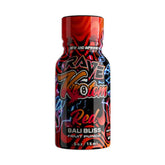Alcohol and kratom: both legal, easily accessible substances that are used worldwide. Yet that doesn’t mean that mixing the two together is a good idea. As with any drug, the most important part of usage is responsibility.
Sure, you can use alcohol and kratom safely on their own – but it’s not necessarily safe to combine them.
When two drugs interact in the brain and body, they don’t always cooperate. Sometimes they work together, other times they get in each other’s way. The result can be disastrous for the user, depending on how kratom and alcohol decide to interact.
Let’s talk about what happens when you mix the two, whether it’s safe, and how you can use best practices to protect yourself.

What Happens When You Mix Alcohol and Kratom?
The specific effects of combining kratom and alcohol haven't been thoroughly studied yet. However, it's crucial to note that the most severe or fatal outcomes related to kratom usage often involve the simultaneous use of other substances.
This polydrug use poses significant risks, overshadowing kratom's otherwise relatively safe profile. For instance, a 2019 report on kratom-related deaths revealed that only 23% of cases involved mitragynine (the active component of kratom) alone, with the remaining 87% involving kratom along with other substances like controlled drugs, therapeutic medications, or alcohol.
According to the NIH, kratom is generally considered safe when used alone, with serious incidents typically arising from the addition of other substances or contaminants. This means that adding anything else to your kratom – however you choose to enjoy it – should be avoided.

How Does Alcohol Interact With the Body?
When alcohol is consumed faster than the liver can process it, we experience the effects of intoxication. This can lead to symptoms like disinhibition, memory lapses, nausea/vomiting, and impaired physical and cognitive function. In severe cases, alcohol toxicity can progress to respiratory depression and even death.
Alcohol is broken down in the body into acetaldehyde by alcohol dehydrogenases. Although acetaldehyde has harmful health effects, it's short-lived and unlikely to pass through the blood-brain barrier. It then undergoes further oxidation to acetate by acetaldehyde dehydrogenases.
However, alcohol metabolism involves multiple pathways, some of which overlap with the metabolism of other drugs. The enzyme CYP2E1 plays a key role in alcohol metabolism but is not exclusive to alcohol. This means that other drugs also compete for its use, leading to potential dosing complications.
If there's insufficient enzyme activity to handle both alcohol and other drugs, those drugs may remain in the body longer, increasing the risk of overdose. Conversely, in chronic alcohol users with heightened enzyme activity, drugs may be metabolized and eliminated too quickly, reducing their effectiveness, which can be risky if the drug is essential medication.
Alcohol also interacts with the Gabaergic system, which involves the neurotransmitter GABA. Other drugs that affect GABA and its receptors can interact or amplify alcohol's effects, potentially leading to heightened intoxication or adverse reactions.

How Does Kratom Interact With the Body?
While research on kratom metabolism isn't as extensive as that of alcohol, we do know that its most potent bioactive compounds are alkaloids like mitragynine and 7-hydroxymitragynine. These alkaloids interact with opioid receptors in the body.
In lower doses, kratom behaves like a stimulant, akin to coffee. However, at higher doses, it exhibits a sedative, depressive effect more akin to opioids.
Although there aren't specific studies on the interaction between kratom and alcohol, we can make some educated guesses based on its interaction with opioid receptors.
Alcohol and Opioids
First and foremost, the NIH advises against mixing alcohol with opioids for several reasons. One of the risks is that both alcohol and opioids are metabolized by the same liver system. When this occurs, the breakdown of these substances slows down, potentially leading to increased toxicity.
Additionally, alcohol may interact with opiates in various other ways. Some suggest that alcohol can alter certain opiate receptors, further complicating the interaction.
Moreover, one of the primary dangers of opiates is respiratory depression. Mixing opiates with alcohol can exacerbate this effect, resulting in slowed breathing, coma, or even death.
Although kratom isn't technically classified as an opioid, it shares many similarities. Therefore, it's essential to exercise caution when combining a substance with opioid-like properties with alcohol.
Alcohol and Stimulants
As mentioned earlier, at lower doses, kratom acts as a stimulant. One concern about consuming stimulants alongside alcohol, a depressant, is that it can obscure the level of intoxication, potentially increasing the risk of overdose.

Can Kratom Be Used for Alcohol Withdrawal?
Let's take a moment to explore how kratom can be beneficial when used independently from alcohol. In fact, kratom is renowned for its potential in alleviating opioid withdrawal symptoms. Early pre-clinical and anecdotal evidence also hints at kratom's effectiveness in addressing alcohol withdrawal.
Further research is necessary to fully understand kratom's impact on alcohol withdrawal.

So… Should You Mix Kratom With Alcohol?
Jumping to conclusions or enacting permanent legislation without sufficient evidence can be risky – regardless of one's stance on kratom. The reality is, we still require more research to fully understand the therapeutic benefits and potential risks of kratom use.
On one hand, kratom serves as a legal and accessible option for individuals who have exhausted other avenues, including those dealing with chronic pain or drug withdrawal.
However, legality doesn't equate to safety. Like any substance, kratom demands responsible usage. It's important to note that the majority of kratom-related fatalities involve the presence of multiple substances. Combining kratom with other drugs, particularly alcohol, can pose significant risks.
Should you have any inquiries about kratom or any of our offerings, don't hesitate to reach out to the Gold Dragon Kratom experts.






